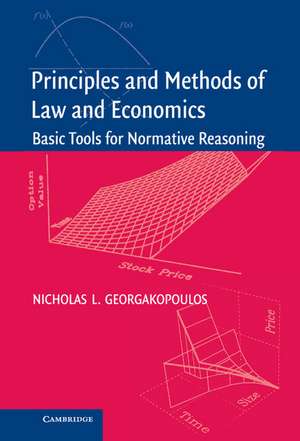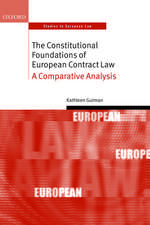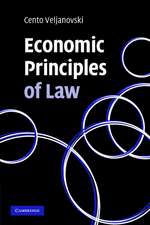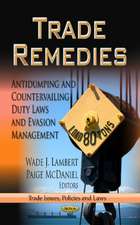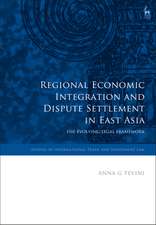Principles and Methods of Law and Economics: Enhancing Normative Analysis
Autor Nicholas L. Georgakopoulosen Limba Engleză Hardback – 9 oct 2005
| Toate formatele și edițiile | Preț | Express |
|---|---|---|
| Paperback (1) | 366.03 lei 6-8 săpt. | |
| Cambridge University Press – 2 oct 2005 | 366.03 lei 6-8 săpt. | |
| Hardback (1) | 783.81 lei 6-8 săpt. | |
| Cambridge University Press – 9 oct 2005 | 783.81 lei 6-8 săpt. |
Preț: 783.81 lei
Preț vechi: 911.41 lei
-14% Nou
Puncte Express: 1176
Preț estimativ în valută:
150.00€ • 154.75$ • 126.95£
150.00€ • 154.75$ • 126.95£
Carte tipărită la comandă
Livrare economică 05-19 martie
Preluare comenzi: 021 569.72.76
Specificații
ISBN-13: 9780521826815
ISBN-10: 0521826810
Pagini: 394
Ilustrații: 45 b/w illus. 15 tables
Dimensiuni: 152 x 229 x 25 mm
Greutate: 0.66 kg
Editura: Cambridge University Press
Colecția Cambridge University Press
Locul publicării:New York, United States
ISBN-10: 0521826810
Pagini: 394
Ilustrații: 45 b/w illus. 15 tables
Dimensiuni: 152 x 229 x 25 mm
Greutate: 0.66 kg
Editura: Cambridge University Press
Colecția Cambridge University Press
Locul publicării:New York, United States
Cuprins
Introduction: innovation in legal thinking; Part I. Principles: 1. From formal logic to normative reasoning; 2. Social welfare versus moral philosophy; 3. From political philosophy to game theory; 4. The importance of distribution of wealth; 5. Coase and law's irrelevance; 6. More failures of coasean irrelevance; Part II. Methods: 7. Mathematical modelling; 8. Confronting uncertainty: basic probability theory; 9. Advanced probability: distributions as the shape of randomness; 10. How to price uncertainty: finance; 11. Finance and probability: options and derivatives; 12. Using spreadsheets; 13. Statistics; 14. Conclusion: importing methodological innovations.
Recenzii
The merits of this volume by Professor Georgakopolos are many. The chapters are clearly organized and well written. His explications of statistical techniques and quantitative argumentation are very clear and should be easy for students, even those with no background in economics or statistics, to follow.
Daniel H. Cole, Indiana University School of Law
Professor Georgakopolos has written a book that displays an unusual and welcome ability to explain complicated concepts in intuitively congenial terms. Readers will especially welcome his discussion of the point of mathematical modeling and his highly accessible treatment of 'technical' methods used in law and economics. They will also profit from his review of the moral, economic, and philosophical underpinnings of normative analysis in the subject.
Steven Shavell, Harvard Law School
Written with insight and rigor this book will prove to be an invaluable resource for scholars and students of law, economics, public policy, and business.
Kent Greenfield, Boston College Law School
Principles and Methods of Law and Economics is a wide-ranging introduction to the bundle of norms, theories, and techniques that comprise the modern field of law and economics. Professor Georgakopoulos explores an unusually broad range of topics for an introductory text, extending from moral philosophy to financial economics, and from corporate law to an exegesis on empirical methods, complete with helpful tips on the use of Microsoft Excel. Principles and Methods is ideal as a student-friendly text for a course on law and economics. The exposition is lucid, and there are numerous useful illustrations and exercises. Equally to the point, however, Principles and Methods is a valuable reference for advanced students, practitioners, and legal scholars who are unfamiliar with the full range of topics that fall within law and economics. Veteran teachers in the field will find imaginative discussion of familiar topics such as the Coase Theorem. But even seasoned academics will find discussion of less well-known topics in the literature that, but for this book, they might never have explored at all. This is a book that will have broad appeal, and deservedly so."
Reinier Kraakman, Harvard law School
Daniel H. Cole, Indiana University School of Law
Professor Georgakopolos has written a book that displays an unusual and welcome ability to explain complicated concepts in intuitively congenial terms. Readers will especially welcome his discussion of the point of mathematical modeling and his highly accessible treatment of 'technical' methods used in law and economics. They will also profit from his review of the moral, economic, and philosophical underpinnings of normative analysis in the subject.
Steven Shavell, Harvard Law School
Written with insight and rigor this book will prove to be an invaluable resource for scholars and students of law, economics, public policy, and business.
Kent Greenfield, Boston College Law School
Principles and Methods of Law and Economics is a wide-ranging introduction to the bundle of norms, theories, and techniques that comprise the modern field of law and economics. Professor Georgakopoulos explores an unusually broad range of topics for an introductory text, extending from moral philosophy to financial economics, and from corporate law to an exegesis on empirical methods, complete with helpful tips on the use of Microsoft Excel. Principles and Methods is ideal as a student-friendly text for a course on law and economics. The exposition is lucid, and there are numerous useful illustrations and exercises. Equally to the point, however, Principles and Methods is a valuable reference for advanced students, practitioners, and legal scholars who are unfamiliar with the full range of topics that fall within law and economics. Veteran teachers in the field will find imaginative discussion of familiar topics such as the Coase Theorem. But even seasoned academics will find discussion of less well-known topics in the literature that, but for this book, they might never have explored at all. This is a book that will have broad appeal, and deservedly so."
Reinier Kraakman, Harvard law School
Notă biografică
Descriere
The book juxtaposes economic analysis with moral philosophy, political theory, egalitarianism, and other methodological principles.
